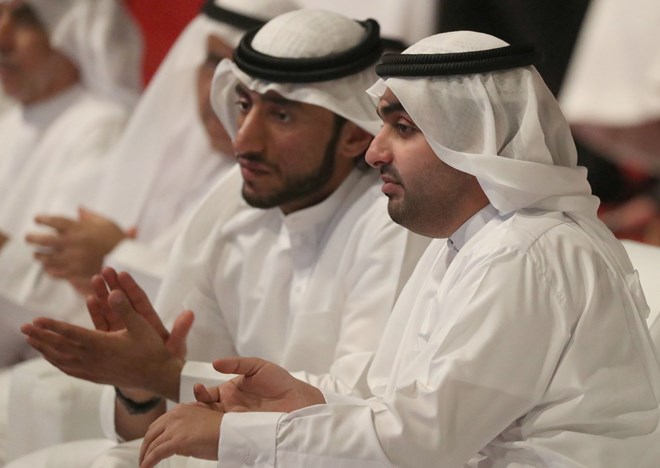The New York Times
Sunday July 15, 2018

The defection of an Emirati prince to Qatar has provided a rare glimpse into tensions among the rulers of the United Arab Emirates and added an awkward complication to its feud with Qatar, its regional rival.
The prince, Sheikh Rashid bin Hamad al-Sharqi, 31, is the second son of the emir of Fujairah, one of the smaller and less wealthy of the seven monarchies that form the United Arab Emirates. Until recently, he ran Fujairah’s pro-government media operation.
Early on the morning of May 16, Sheikh Rashid unexpectedly turned up at the airport in Doha, the capital of Qatar, asking for asylum.
He told Qatari officials that he feared for his life because of a dispute with the rulers of Abu Dhabi, the oil-rich city-state that dominates the U.A.E., as Sheikh Rashid and a Qatari close to the ruling family confirmed in interviews.
A representative of the Emirati Embassy in Washington declined to comment, and the rulers of Fujairah could not be reached.
Sheikh Rashid’s flight to Doha appears to be the first time in the nearly 47-year history of the U.A.E. that a member of one of its seven royal families has publicly criticized its rulers, according to scholars of the region. In an interview with The New York Times, Sheikh Rashid accused Emirati rulers of blackmail and money laundering, though he provided no evidence to support his claim.
He also spoke publicly about tensions among the Emirates that were previously discussed only in whispers — notably resentments over Abu Dhabi’s leadership of the U.A.E.’s military intervention in Yemen.
The rulers of Abu Dhabi, he charged, did not consult the emirs of the other six Emirates before committing their troops to the war, now three years old, against an Iranian-allied faction in Yemen. But soldiers from smaller emirates, such as Fujairah, have filled the front lines and accounted for most of the war deaths, which Emirati news reports have put at a little more than 100.
“There have been more deaths from Fujairah than anywhere else,” Sheikh Rashid said, and he accused Abu Dhabi of hiding the full death toll.
He said he decided to give the interview in the hope that public attention to his case would protect his family in Fujairah from pressure by Abu Dhabi, and he appeared to hope that threatening further disclosures might give him leverage against Abu Dhabi as well. “I am the first in a royal family going out of the U.A.E. and telling everything about them,” he said.
But his arrival in Doha has also posed a dilemma for Qatar, in part because of uncertainty surrounding Sheikh Rashid’s dispute with Abu Dhabi.
The U.A.E. and Saudi Arabia have led a campaign to isolate Qatar, cutting off all diplomatic and trade relations in an effort to pressure the tiny petroleum-rich monarchy to adhere to a common foreign policy and join their crackdown on political Islam. Adding to the pressure, Abu Dhabi has played host to a handful of exiled members of the Qatari royal family, playing up their criticism of the current emir and promoting them as alternative leaders.
Qatar, however, has declined to publicly acknowledge Sheikh Rashid’s presence. The Qatari close to the royal family confirmed that Qatar had allowed Sheikh Rashid to stay, but a government spokesman declined repeated requests for comment.
Scholars of the region say Qatar is likely to fear escalating its confrontation with the U.A.E. by appearing to sponsor a dissident royal in exile. But the Qatari said the government was also uneasy about the details of Sheikh Rashid’s dispute with Abu Dhabi.
In the interview, Sheikh Rashid accused Abu Dhabi intelligence agencies of blackmailing him with the threat of releasing embarrassing videos of a personal nature. He called the videos “fabricated” but he declined to disclose the content of the material, raising the possibility that, if they emerged, the video might embarrass his Qatari hosts as well.
Sheikh Rashid also claimed that the intelligence agencies had pressured him to transfer tens of millions of dollars on their behalf to people he did not know in other countries, which would appear to violate Emirati and international laws against money laundering.
“They said, ‘send money here’ and ‘send money there’ as part of their agenda,” he said, adding that he had transferred as much as $70 million total to Jordan, Lebanon, Morocco, Egypt and Syria, and as far away as India and Ukraine.
He was unable to provide evidence corroborating the accusation, saying that invoices for those transactions remained in Fujairah.
By his own account, Sheikh Rashid began refusing further requests this spring when an Emirati intelligence operative brought up his family, the rulers of Fujairah. Sheikh Rashid said he interpreted the operative’s comments to mean that the agencies wanted him to seek to replace his older brother as crown prince.
Scholars who study the Persian Gulf said the leaders of the other Emirates had often grumbled privately about Abu Dhabi’s dominance of the U.A.E. and its foreign policy. “It is rare for such elite politics to spill out so publicly in the U.A.E.,” said David B. Roberts, a professor at Kings College London who studies the Persian Gulf.